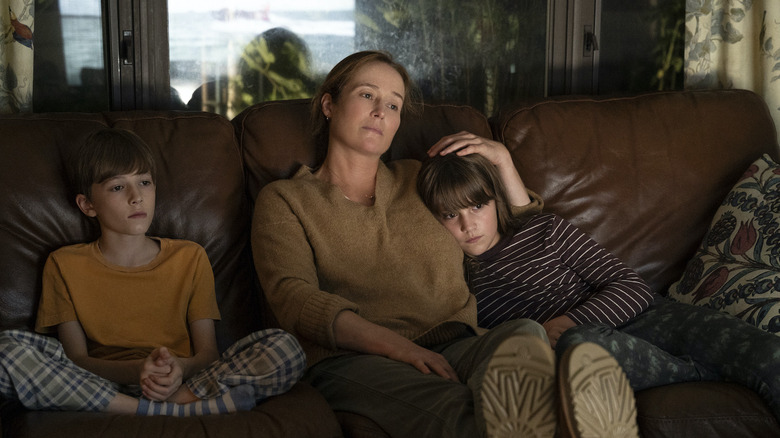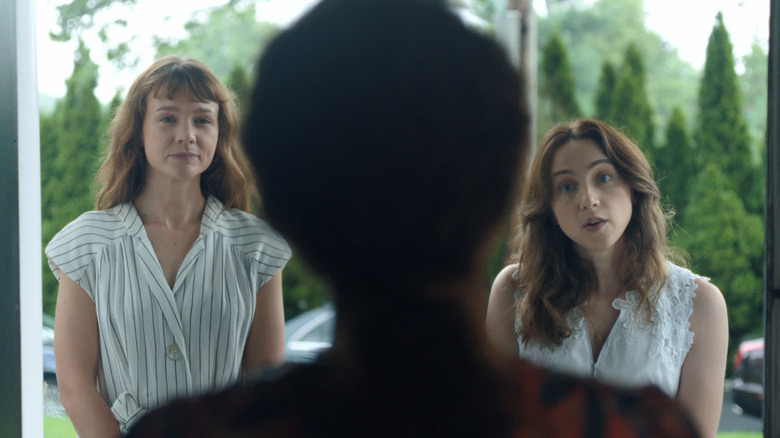She Said Review: The Harvey Weinstein Exposé Drama Talks A Lot But Unearths Little [NYFF]
What is the proper amount of time for a scandal or traumatic event to let lie before it inevitably gets adapted by Hollywood? Recently, it feels like that window is getting smaller and smaller — within a few years we've gotten adaptations of the 2016 Trump election ("The Comey Rule") and the Roger Ailes ousting ("Bombshell"), while HBO has enough political miniseries about controversial elections to make up a small army. So it seemed inevitable with the ubiquity of the Me Too movement and the partiality that Hollywood shows towards movies about journalism and, well, itself, that we would get a movie about Harvey Weinstein.
Based on the 2019 book of the same name by New York Times journalists Jodi Kantor and Megan Twohey, "She Said" chronicles the reporting of the five-month exposé that revealed the history of abuse and sexual misconduct by one of the most powerful producers in Hollywood, kicking off a movement that would result in Weinstein's dismissal and his conviction and imprisonment for multiple counts of rape and sexual assault. But this isn't about Weinstein, who looms in the background of "She Said" like some kind of high-powered boogeyman. This is about the women — the women who weren't able to speak out, the women who want to speak out, and the women who gave them a voice ... supposedly.
Reactions to "She Said" upon its announcement were mostly in the forms of eye rolls — how obvious, how unoriginal this movie must be, to be adapting something that is still so fresh in all our memories, and which we ourselves saw play out through tweets, through comprehensive articles, and through criminal trials just a few years ago. So could the Weinstein exposé stand being blown up from our phone screens for the big screen? Not quite.
Building (and breaking down) the case
Directed by German director Maria Schrader (best known for directing Netflix's "Unorthodox" and the 2021 sci-fi romance "I'm Your Man"), "She Said" is an impassioned but pedestrian journalism drama that manages to translate little of the heat from its hot-button subject. Despite a furious performance from Carey Mulligan, who plays no-nonsense journalist Megan Twohey, alongside Zoe Kazan's endearingly uncertain journalist Jodi Kantor, and impressive supporting turns from Patricia Clarkson, Andre Braugher, Samantha Morton, and Jennifer Ehle, "She Said" has a lot to say about what happened, but little to add to it — instead feeling like a mechanical rehash of things we already knew.
The movie opens in 1992 Ireland, where a young woman walking a dog happens upon an 18th-century warship — it's a film production, and her friend is on the crew. She happily joins the crew and gets a job as a runner, until we smash cut to her sprinting down the street with her clothes askew and tears running down her face. Twenty-odd years later in New York City, Megan Twohey and Jodi Kantor are two ace reporters at the New York Times, Megan working on an exposé of presidential candidate Donald Trump and Jodi reporting on immigrant and refugee issues. So it's kind of a coincidence that Jodi lands the assignment of Hollywood mogul Harvey Weinstein, who had been the subject of all kinds of hush-hush stories of sexual misconduct. A rattled Megan returns after recovering from maternity leave, and a series of death threats over her Trump articles, to join Jodi on the investigation; at first quirking an eyebrow over covering a story about affluent actresses, before making a few calls and getting blocked by a few dozen NDAs reveals to her that this abuse is not isolated, it's systemic.
Mulligan manages to make a meal out of Rebecca Lenkiewicz's rather dry script, which is frontloaded with enough buzzwords that it almost feels like a satire of a Me Too movie. It doesn't help that it's a weak impersonator of Rose McGowan's voice that kicks off the investigation — calling Kazan's intrepid but easily starstruck Jodi about being ignored for her stories about Weinstein. Nor does it help when Ashley Judd appears in the film to play herself, anchoring herself as a key figure in Weinstein's fall and a stiff performer when it comes to reenacting her own life. "She Said" is all too aware of its importance and place in Hollywood, which diminishes its potential impact and power. Only when Mulligan's Megan hits the pavement to begin the investigation proper, and when Morton and Ehle appear to play the young assistants that Weinstein victimized, does the film feel like it starts to come into its own. But even then, it never quite reaches the heights it aspires to.
Following the paper trail
It's almost unfortunate how "All the President's Men" was so unerringly good that it set the standard for nearly every journalism movie to follow — and thus, set most of them up for failure. "She Said" gamely follows the broad strokes of that standard journalism movie, but its attempts to set itself apart — cameos from actresses playing themselves, curiously placed flashbacks, real voice recordings playing across empty hotel hallways — only makes one wonder if this story would have been better served as a documentary.
Maybe it's too difficult to make a good old-fashioned journalism movie in the era of iPhones and Twitter — one particularly laughable scene involves Kazan seriously looking at a blown-up print-out of a tweet. But surely there must be more tension to be drawn, more suspense to be built out of the story than to feature multiple scenes of Mulligan and Kazan recounting dropped lawsuits, anonymous actress horror stories, and hushed financial settlements to their superiors (Braugher and Clarkson).
But to be fair, the journalism movie beats are the strongest parts of "She Said;" the satisfaction of watching Mulligan knock on doors and follow paper trails, or seeing Kazan meet up with their equivalent of Deep Throat, Weinstein finance executive Irwin Reiter, is inarguably satisfying. But "She Said" is not as economical in its filmmaking as "Spotlight" nor as robust as "Shattered Glass." Instead, as a journalism movie, it just feels rote. As a biographical drama, it feels too early. And as a Me Too movie, it feels too quiet.
/Film Rating: 5 out of 10


